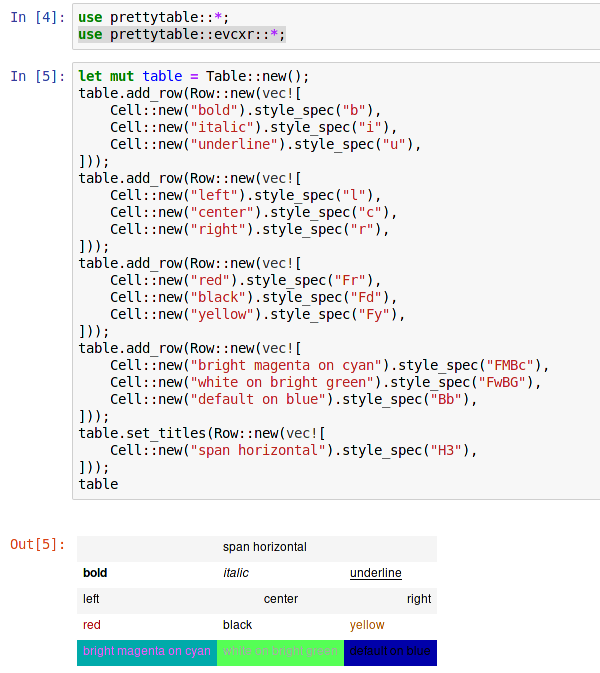1 个不稳定版本
| 0.10.0 | 2022 年 12 月 27 日 |
|---|
146 在 命令行界面 中排名
27,468 每月下载量
在 70 个 crates(52 个直接) 中使用
125KB
2.5K SLoC
prettytable-rs
一个用于 Rust 的格式化和对齐的表格打印库。
版权 © 2022 Pierre-Henri Symoneaux
本软件分发时不附带任何保证
请查阅 LICENSE.txt 文件以获取更多信息。
如何使用
包括
通过在您的 Cargo.toml 文件中添加以下行将库作为依赖项包含到您的项目中:
[dependencies]
prettytable-rs = "^0.10"
该库需要至少 rust v1.56。
对 MSRV 的任何更改都将通过小版本号升级来完成。
SemVer 政策
- 1.0.0 之前的破坏性更改将遵循小版本号升级
- 1.0.0 之后 本库的所有默认功能都由 SemVer 覆盖
- 如上所述,MSRV 被视为不受 SemVer 的约束
基本用法
开始使用它
#[macro_use] extern crate prettytable;
use prettytable::{Table, Row, Cell};
fn main() {
// Create the table
let mut table = Table::new();
// Add a row per time
table.add_row(row!["ABC", "DEFG", "HIJKLMN"]);
table.add_row(row!["foobar", "bar", "foo"]);
// A more complicated way to add a row:
table.add_row(Row::new(vec![
Cell::new("foobar2"),
Cell::new("bar2"),
Cell::new("foo2")]));
// Print the table to stdout
table.printstd();
}
上面的代码将输出
+---------+------+---------+
| ABC | DEFG | HIJKLMN |
+---------+------+---------+
| foobar | bar | foo |
+---------+------+---------+
| foobar2 | bar2 | foo2 |
+---------+------+---------+
使用宏
对于日常使用,请考虑使用 table! 宏。此代码将产生与上面相同的输出
#[macro_use] extern crate prettytable;
fn main() {
let table = table!(["ABC", "DEFG", "HIJKLMN"],
["foobar", "bar", "foo"],
["foobar2", "bar2", "foo2"]);
table.printstd();
}
ptable! 宏结合创建和打印表格
#[macro_use] extern crate prettytable;
fn main() {
let table = ptable!(["ABC", "DEFG", "HIJKLMN"],
["foobar", "bar", "foo"],
["foobar2", "bar2", "foo2"]);
}
表格也支持多行单元格内容。因此,您可以打印一个表格到另一个表格(yo dawg ;)。例如
let table1 = table!(["ABC", "DEFG", "HIJKLMN"],
["foobar", "bar", "foo"],
["foobar2", "bar2", "foo2"]);
let table2 = table!(["Title 1", "Title 2"],
["This is\na multiline\ncell", "foo"],
["Yo dawg ;) You can even\nprint tables\ninto tables", table1]);
table2.printstd();
将打印
+-------------------------+------------------------------+
| Title 1 | Title 2 |
+-------------------------+------------------------------+
| This is | foo |
| a multiline | |
| cell | |
+-------------------------+------------------------------+
| Yo dawg ;) You can even | +---------+------+---------+ |
| print tables | | ABC | DEFG | HIJKLMN | |
| into tables | +---------+------+---------+ |
| | | foobar | bar | foo | |
| | +---------+------+---------+ |
| | | foobar2 | bar2 | foo2 | |
| | +---------+------+---------+ |
+-------------------------+------------------------------+
行可能包含不同数量的单元格。表格将自动适应最长的行,通过在较短的行中打印额外的空单元格来打印。
风格化处理!
表格可以通过配置设置(背景和前景颜色、粗体和斜体)以及通过 term crate 来具有样式化的输出。单元格中的对齐也可以设置(左、右、居中),并且单元格可以跨越多个列。
term 风格属性被直接重新导出
-
直接
use prettytable::{Attr, color}; /* ... */ table.add_row(Row::new(vec![ Cell::new("foobar") .with_style(Attr::Bold) .with_style(Attr::ForegroundColor(color::GREEN)), Cell::new("bar") .with_style(Attr::BackgroundColor(color::RED)) .with_style(Attr::Italic(true)) .with_hspan(2), Cell::new("foo") ])); -
通过样式字符串
table.add_row(Row::new(vec![ Cell::new("foobar").style_spec("bFg"), Cell::new("bar").style_spec("BriH2"), Cell::new("foo")])); -
使用
row!宏table.add_row(row![bFg->"foobar", BriH2->"bar", "foo"]); -
使用
table!宏(此宏创建一个新的表格,与前面的例子不同)table!([bFg->"foobar", BriH2->"bar", "foo"]);
这里
- bFg 表示 粗体,Foreground: green,
- BriH2 表示 Background: red, italic, Horizontal span of 2。
另一个例子:FrBybc 表示 Foreground: red, Background: yellow, bold, center。
所有在宏中设置单元格样式的案例
- 使用
row!,对每个单元格单独设置row![FrByb->"ABC", FrByb->"DEFG", "HIJKLMN"]; - 使用
row!,对整个行设置row![FY => "styled", "bar", "foo"]; - 使用
table!,对每个单元格单独设置table!([FrBybl->"A", FrBybc->"B", FrBybr->"C"], [123, 234, 345, 456]); - 使用
table!,对整个行设置table!([Frb => "A", "B", "C"], [Frb => 1, 2, 3, 4], [1, 2, 3]); - 使用
table!,混合样式table!([Frb => "A", "B", "C"], [Frb->1, Fgi->2, 3, 4], [1, 2, 3]);
样式指定符列表
- F : Foreground(必须后跟颜色指定符)
- B : Background(必须后跟颜色指定符)
- H : Horizontal span(必须后跟数字)
- b : bold
- i : italic
- u : underline
- c : Align center
- l : Align left
- r : Align right
- d : default style
颜色指定符列表
小写字母代表 普通 颜色
- r : Red
- b : Blue
- g : Green
- y : Yellow
- c : Cyan
- m : Magenta
- w : White
- d : Black
大写字母代表上述颜色的 亮色 对应色
- R : Bright Red
- B : Bright Blue
- 等等...
切片
表格可以被分割成不可变的借用子表格。分割的类型为 prettytable::TableSlice<'a>。
例如,
use prettytable::Slice;
/* ... */
let slice = table.slice(2..5);
table.printstd();
将打印出从 table 中第 2、3 和 4 行的表格。
支持其他 Range 语法。例如
table.slice(..); // Returns a borrowed immutable table with all rows
table.slice(2..); // Returns a table with rows starting at index 2
table.slice(..3); // Returns a table with rows until the one at index 3
自定义表格的外观和感觉
可以使用 prettytable::format::TableFormat 来自定义表格的外观和感觉。
可配置的设置包括
- 边框(左侧和右侧)
- 接合点
- 列分隔符
- 行分隔符
- 标题(使用
table.set_titles())
为此,可以
- 创建一个新的
TableFormat对象,然后调用设置器直到获得所需的配置; - 或者使用方便的
FormatBuilder和构建器模式,如下所示
let mut table = Table::new();
let format = format::FormatBuilder::new()
.column_separator('|')
.borders('|')
.separators(&[format::LinePosition::Top,
format::LinePosition::Bottom],
format::LineSeparator::new('-', '+', '+', '+'))
.padding(1, 1)
.build();
table.set_format(format);
table.set_titles(row!["Title 1", "Title 2"]);
table.add_row(row!["Value 1", "Value 2"]);
table.add_row(row!["Value three", "Value four"]);
上面的代码将使表格看起来像
+-------------+------------+
| Title 1 | Title 2 |
| Value 1 | Value 2 |
| Value three | Value four |
+-------------+------------+
为了方便,在 prettytable::format::consts 模块中预定义了几个格式。
一些格式及其相应的输出
-
use prettytable::format; table.set_format(*format::consts::FORMAT_NO_LINESEP_WITH_TITLE);+-------------+------------+ | Title 1 | Title 2 | +-------------+------------+ | Value 1 | Value 2 | | Value three | Value four | +-------------+------------+ -
use prettytable::format; table.set_format(*format::consts::FORMAT_NO_BORDER_LINE_SEPARATOR);Title 1 | Title 2 ------------+------------ Value 1 | Value 2 Value three | Value four
请检查 API 文档以获取可用的预定义格式的完整列表。
CSV 导入/导出
表格可以从和导出到 CSV。这得益于默认和可选功能 csv。
csv功能可能在未来的主要版本中默认禁用。
导入
Table 可以从字符串导入
let table = Table::from_csv_string("ABC,DEFG,HIJKLMN\n\
foobar,bar,foo\n\
foobar2,bar2,foo2")?;
或从 CSV 文件导入
let table = Table::from_csv_file("input_csv.txt")?;
这两种导入 CSV 的方法假定 CSV 格式没有标题,并且由逗号分隔
还可以从 CSV 读取器导入,这允许对 CSV 格式进行更多定制
let reader = /* create a reader */;
/* do something with the reader */
let table = Table::from_csv(reader);
导出
导出为通用 Write
let out = File::create("output_csv.txt")?;
table.to_csv(out)?;
或导出到 csv::Writer<W: Write>
let writer = /* create a writer */;
/* do something with the writer */
table.to_csv_writer(writer)?;
关于行结束符的说明
默认情况下,该库会使用特定平台的换行符打印表格。这意味着在Windows上,换行符将以 \r\n 的形式显示,而在其他平台上将以 \n 的形式显示。自 v0.6.3 版本起,通过默认功能 win_crlf 激活特定平台的换行符,该功能可以禁用。当此功能被禁用(例如,使用 cargo 中的 --no-default-features 标志)时,在任何平台上换行符都将显示为 \n。
这种定制能力可能会在未来的版本中移动到格式化 API。
在文档和 示例 目录中提供了额外的示例。
Evcxr 集成
Evcxr 是一个 Rust REPL 和一个 Jupyter notebook 内核。该 crate 使用 evcxr 功能标志集成到 Evcxr 和 Jupyter notebooks 中,这可以启用表格的本地显示。这包括对显示颜色和不同格式的支持。
您可以使用以下行将 prettytable 作为依赖项包含
:dep prettytable = { git = "https://github.com/phsym/prettytable-rs", package = "prettytable-rs", features = ["evcxr"] }

依赖项
~1.8–9.5MB
~63K SLoC